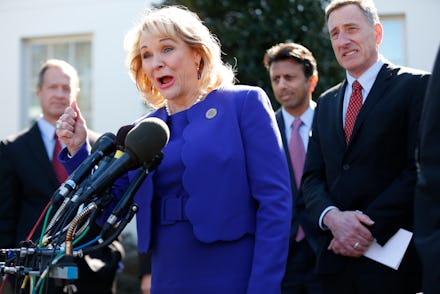Oklahoma's Governor Has Quietly Passed a Bill With Devastating Consequences for Young People

Oklahoma Gov. Mary Fallin signed a bill last Monday banning cities in the state from establishing a mandatory minimum wage or requiring employers to provide a mandatory minimum number of paid sick or leave days. Any existing or future ordinances regarding these issues would be considered null and void.
With this perfunctory stroke of her pen, Fallin claimed that raising the minimum wage would "drive businesses to other communities and states and would raise prices for consumers." The conservative governor, elected in 2010, went on to assert that most minimum wage-earners are "young, single people working part-time or entry-level jobs."
Unfortunately, that's not exactly accurate, governor. And even if it were, do young, single people not deserve a living wage? Regardless, the following are a few important facts Fallin and her advisers apparently failed to recognize — or perhaps, willfully ignored — during the minimum-wage debate.
4. Fallin claims businesses will move if put under pressure to pay their employees more, yet 21 states (and D.C.) already have a minimum wage higher than the federal rate, 20 — including Oklahoma — set their minimum wage by referencing the federal rate and of the nine states that have a lower (or no) minimum wage, Oklahoma shares a border with just one (out of six neighboring states). There is little to no economic incentive for businesses based in Oklahoma to move.
5. Fallin may claim that businesses will move, but the cost of doing business in Oklahoma makes it the second best state for businesses in the country, which is not something an increased labor cost will irreparably harm.
6. Yet, that same study ranks Oklahoma 45th in quality of life and 48th in education. If we're going to praise free-market values, tell me why I should work in Oklahoma if there are 47 other states offering better living conditions and 44 states that have better schools for my children to attend, both of which are directly impacted by household earnings.
9. Further, there is no substantial evidence that increasing the minimum wage throughout our country's history has led to an adverse effect on job creation. None. Zero.
10. Finally, while paying workers more fails to hurt the economy, the health of workers certainly does. Oklahoma ranks 44th nationally in the health of its citizens. If one was to believe this doesn't impact quality of life — and by extension, economic growth — that person (or persons) would be sorely mistaken.